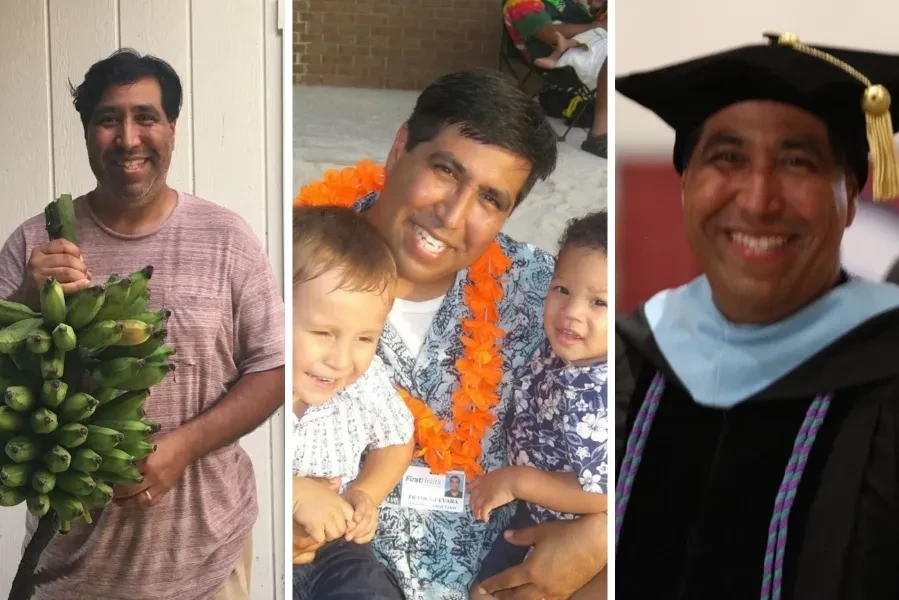When Dr. Frank Guevara began his undergraduate studies at Stanford University, he had his sights set on becoming a medical doctor.
The day he walked into the Bing Nursery School, a laboratory school in the Department of Psychology at Stanford, however, his life changed forever.
“I remember walking through those doors and feeling like I was home,” recalls Dr. Guevara, core faculty member and Assistant Professor in the Associate of Arts in Early Childhood Education program in the Department of Education and Liberal Arts at University of Arizona Global Campus (UAGC). “It felt so familiar, and it really changed the trajectory of my education.”
So much, in fact, that he immediately switched his major to pursue a Bachelor of Arts in Human Development.
“As soon as I took my first class and completed it, I knew that was my purpose,” he says.
Dr. Guevara relates the sense of “home” he felt walking into the nursery school to his upbringing. The son of Mexican nationals who immigrated to the United States in their 20s, he grew up in Los Angeles and was one of four children who were part of a very large extended family. Although his parents and two sisters spoke Spanish, Dr. Guevara’s primary language when he was growing up was English.
“I vividly recall asking how to say English words the way abuelita spoke,” he laughs, adding that being a second-generation American has been an “interesting experience.”
As a young student, Dr. Guevara attended the first bilingual kindergarten in his school district and has fond memories of his monolingual Spanish-speaking peers coming to life on the days when instruction was done in their native tongue.
Growing up among dual-language learners — along with the work he did at Stanford — would set the stage for the rest of his career.
“That type of foundational experience where education is responsive to children’s needs really fits with my story,” he explains.
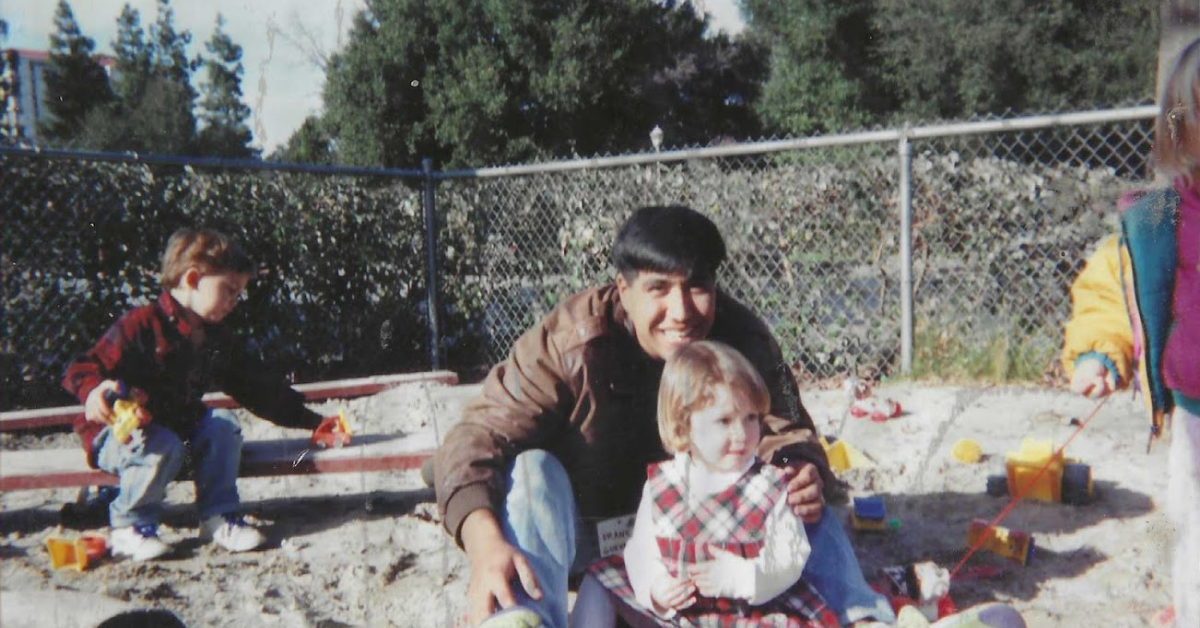
Dr. Guevara during his early teaching years while working at Bing Nursery School at Stanford University, circa 1993.
A Rich Career in Education
Dr. Guevara’s life has been full of rich moments both personally and professionally.
While at the Bing Nursery School, where he worked during his undergraduate studies and after graduation, he learned from master teachers about the nuances, finesse, and thoughtfulness that needs to go into promoting children’s development and learning.
In addition to teaching in the laboratory schools at Stanford University and Pacific Oaks College, as well as his work with corporate and private childcare programs, he worked for 15 years in administration and managed programs in California, Texas, North Carolina, and Colorado in a variety of settings from working with the Department of Defense to supporting teachers in Head Start programs.
“I tried to be very intentional in expanding the types of settings in which I’ve worked to be able to understand the whole tapestry of early care and education across this country because it is so varied,” he says.
Eventually, he moved into higher education as an adjunct professor at a community college, first in Texas and then North Carolina.
“That just excited me so much because now I was really passing along the experiences I gained from my own education and professional background to really help prepare teachers* who were either new to the classroom or who were not new but didn’t have the education and training to best serve students,” he says.
Later, he served as Assistant Professor in Early Childhood Education at Western New Mexico University, during which time he helped the program attain National Association for the Education of Young Children (NAEYC) accreditation.
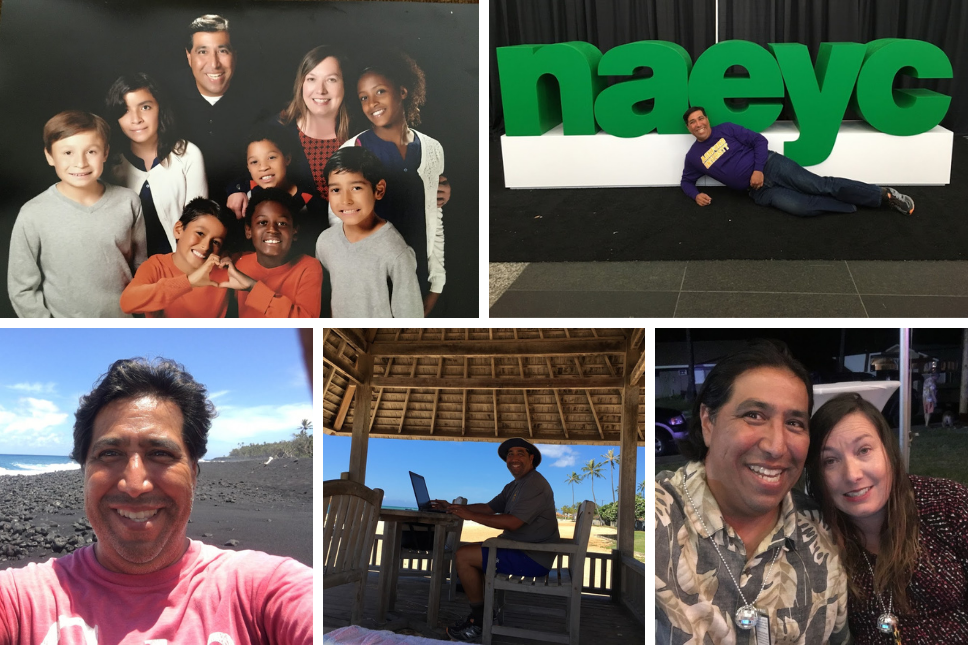
Over the years, his main goal has always been to prepare the next generation and help shape, guide, and influence emerging early childhood professionals.
“As I’ve come along in my journey, I have recognized that that investment in high quality, early learning experiences provided by individuals who have a solid foundation of child growth and development milestones and progression, as well as the most current research-based teaching strategies – when those two elements are present – children are able to have incredible, positive outcomes,” he explains.
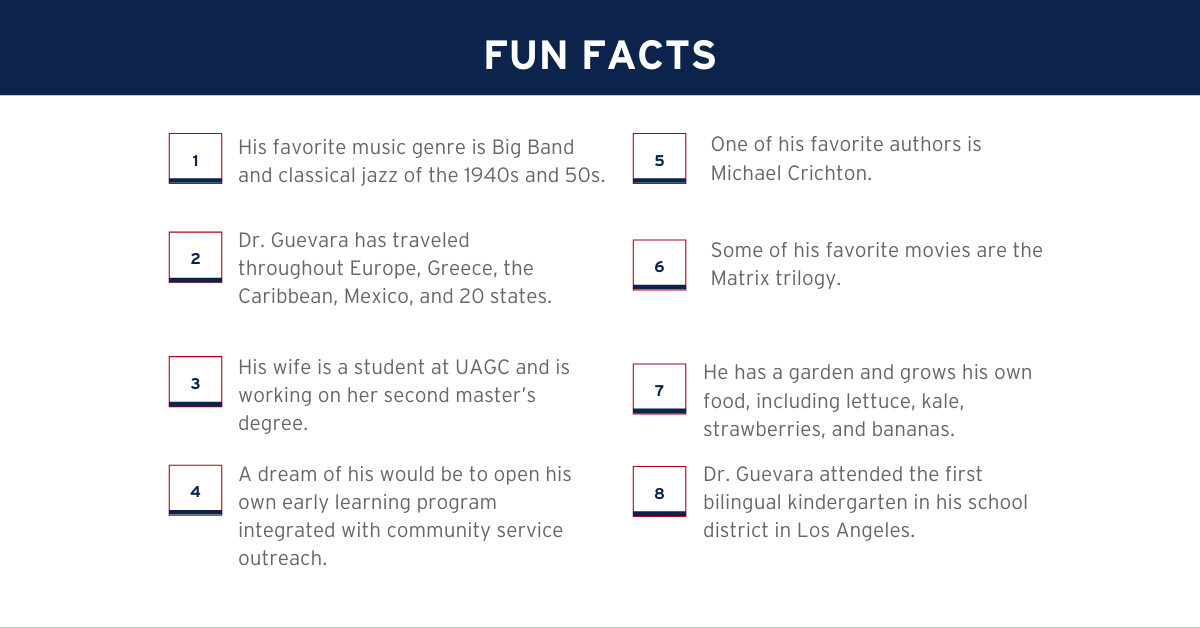
A Doctor Afterall
Dr. Guevara’s passion and love for children and education is evident beyond the figurative classroom. He and his wife, Donna, served as foster parents to eight kids and formally adopted seven, all of whom still live with them today in Oahu, Hawaii.
Perhaps his greatest accomplishment outside of his family and career is earning his PhD. While pursuing his doctorate, he was a working professional, a father, and a full-time student.
“It was the hardest thing I have ever done,” he admits.
It’s this background that he says allows him to fully relate to his students at UAGC.
“I got to the point where I thought I couldn’t finish and that I wasted eight years of my life, the last six of which were writing the dissertation, and a lot of it had to do with the same struggles our students face,” he says. “There were plenty of times I had to retake a class or take a leave of absence because life was too overwhelming.”
At one point, he almost quit.
Dr. Guevara gets choked up thinking about the moment he received the help he needed to reach the finish line.
“I was so fortunate to have a faculty member reach out and say, ‘I know you are working hard and are stuck, and I want to be a mentor and help you,’” he recalls. “It was so good to know that somebody had my back and saw potential in me to be able to be successful with that overwhelming endeavor.”
His persistence — along with a little guidance from a caring professor — made all the difference, and it’s a philosophy he practices with his own students at UAGC today.
It would take Dr. Guevara a decade to finally earn that title of doctor, only this time, it was the perfect fit.
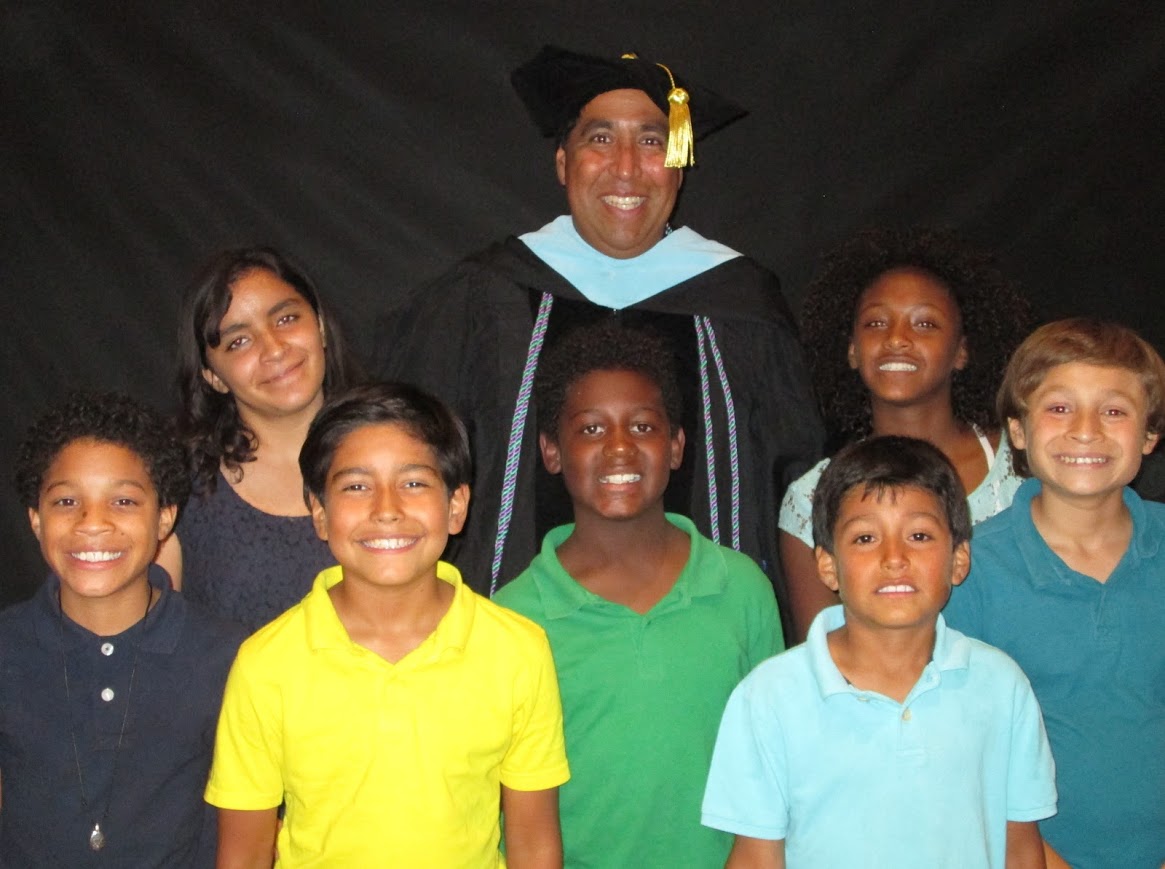
Dr. Guevara with his seven children at his doctoral graduation in 2017.
Getting to Know Dr. Frank Guevara
We recently spoke with Dr. Guevara about his career and work in the field of early childhood education. Read on to learn more about his thoughts on education, dual-language learners, work/life balance, and more.
UAGC: How does your personal and professional experience translate to how you serve students with a Hispanic background?
Dr. Guevara: Having lived a majority of my life on the cusp or in-between worlds, I have been privileged to work at Spanish-serving institutions where a majority of students were of Hispanic background and had similar upbringings to my own, so it enables me to connect with them and understand the challenges they might have. As I grade papers, I read between the lines and can see how they translate concepts from Spanish to English and even if they are not grammatically correct, I understand, and it makes sense. It’s not uncommon for me to reach out in Spanish to bridge the gap.
As students have come to know me, and my background, there has been a connection that, “Oh look, here is somebody like me and who has been able to achieve XYZ, so I know that I can do that, too,” and I am extremely grateful to have these opportunities. Things like that have been the most memorable for me and from the student experience because of that background connection and shared experience.
UAGC: What advice do you have for dual-language students who struggle with English as their second language but who want to pursue a college degree?
Dr. Guevara: Nearly 20% of students in the U.S. are dual-language learners, so you have an incredible asset to connect with and support those students by leveraging your home language. Your understanding of the concepts and their application are what matters most — so take advantage of the many UAGC resources (Writing Center/Grammarly) to help you be a successful student.
UAGC: What is the best advice you can offer to a student who is struggling to balance school with work and life?
Dr. Guevara: I strongly encourage students to reach out to their instructor to explain what is going on and request support. Having been an online student, I know that sometimes there aren’t enough hours in the day to get everything done. Now as an instructor, I approach my work with the philosophy of extending grace to my students because I know how hard it is to be a full-time student, parent, professional, spouse, etc.
And I’m proud of the UAGC faculty who teach here because we’re committed to supporting our students. It is our profound responsibility to connect with students and make a difference in their lives. As I sit in my professor’s chair every day, I think about how I want to push students to be professionals, but I also know they are human beings who are struggling with a million obstacles in their daily lives and if I can be a person who helps them overcome those obstacles and just listen to their challenges that they are facing and give them some comfort by saying, “I went through that, too and understand, and we are going to do this together, you have my full support. If I can do that, there will be 100 more Dr. Guevaras in the world.
UAGC: What is the most important thing one should know about a career in ECE?
Dr. Guevara: The first five years of a child’s life have the potential to set the trajectory for future successes or challenges. So, it’s essential that ECE professionals gain the skills and knowledge to provide children with the best preparation possible. You are literally changing lives in all that you do.
UAGC: What would you tell a student considering a degree in ECE but who is on the fence?
Dr. Guevara: You need to be passionate about this profession, because children deserve educators who are committed to supporting their development in light of the challenges they may bring to the classroom. If this isn’t your passion, then that might be a sign to look at another career path. But if your heart smiles in observing a child make a discovery, then welcome to ECE.
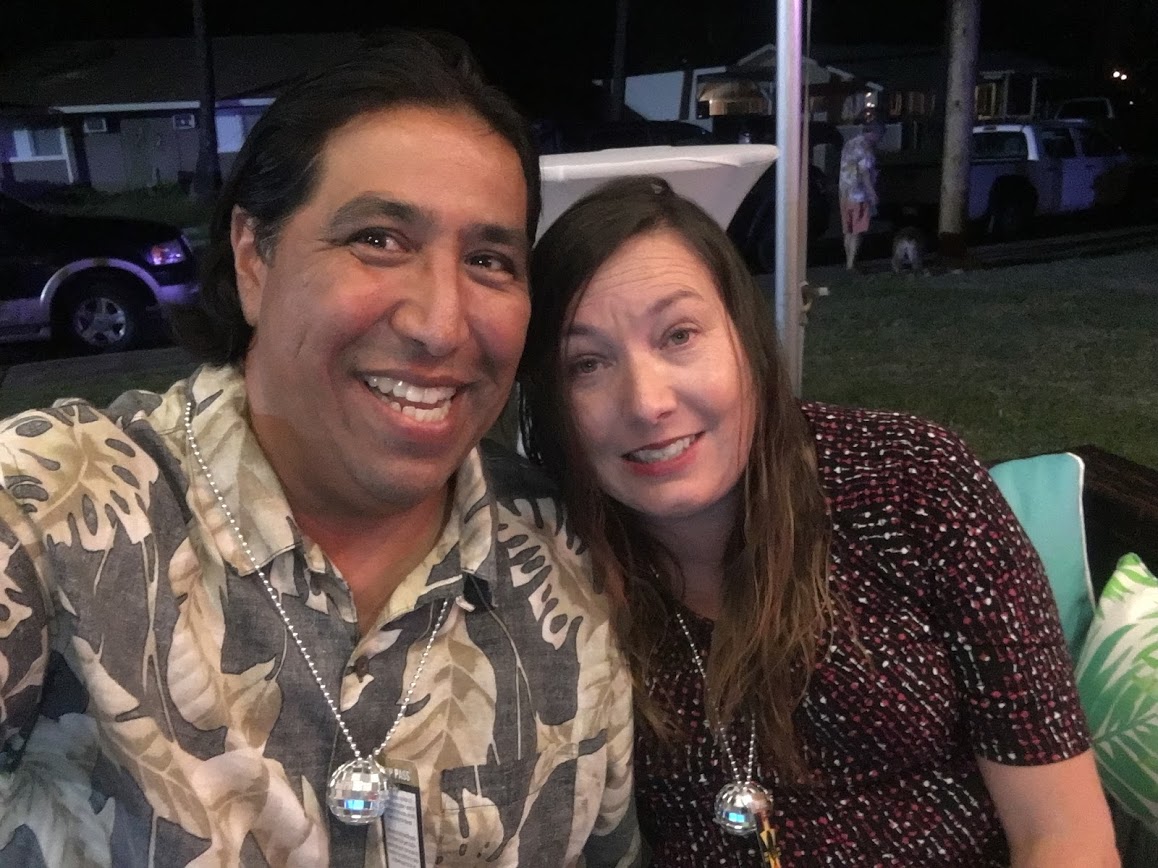
Dr. Guevara celebrates New Year's Eve 2020 with his wife.
UAGC: Who is your greatest inspiration and why?
Dr. Guevara: I’m indebted to the many great teachers I’ve had who believed in me and pushed me as a student. But I owe my success to my wife who’s been my loudest cheerleader – she inspired me to pursue my doctoral degree, supported me through those long 10 years, and has been my partner through all the ups and downs professionally and as a parent. In fact, because of her experience earning an MA from Ashford** and now working on a second master’s degree at UAGC, I decided to enroll in my master’s degree in special education.
UAGC: Why did you decide to return to school for another degree?
Dr. Guevara: I never completed my first MA program because life got in the way; luckily I was able to transfer those credits to my doctoral degree program, so when I finish this program I’ll finally have my MA degree.
As someone who didn’t earn a traditional education degree, the bulk of my experience with special education has been as a parent or with transition services from the ECE programs I oversaw in the public-school setting. Now I’m really learning about how children are qualified for special education, developing Individual Education Plans, case law that underpins these processes, and will later delve into differentiated instruction. With this new knowledge, I will be able to provide more insight to ECE students on how to best meet the needs of young children with exceptionalities.
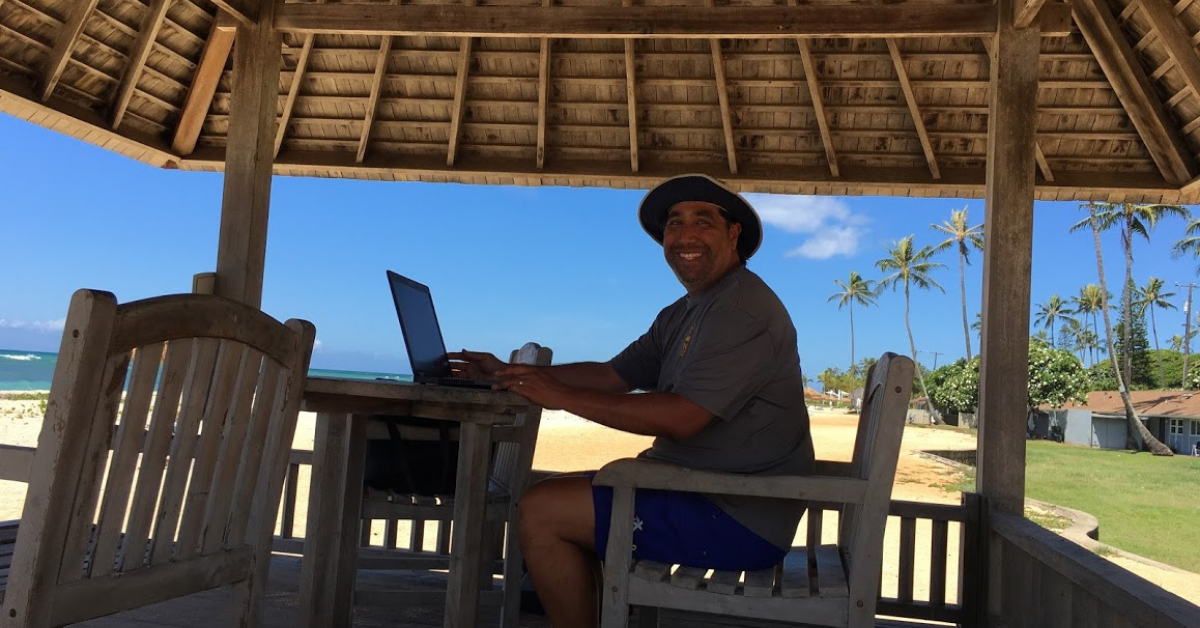
Dr. Guevara enjoys his beach office in Oahu.
UAGC: What is one regret you have and why?
Dr. Guevara: Life has taught me to appreciate the experiences that come with your decisions and the path you end up traveling, even if it wasn’t the one you initially planned to take. Instead of looking at it as if I might have missed out on something, I focus on the rich experiences I’m living through and the lessons I can take with me on this journey we call life.
Interested in a Degree in Early Childhood Education?
If Dr. Guevara has inspired you and you would like to learn more about a degree in early childhood education from UAGC, contact an advisor today.
--
Erin Ansley is the content manager for UAGC.
* An online degree from the University of Arizona Global Campus does not lead to immediate teacher licensure in any state.
** Ashford University is now the University of Arizona Global Campus.
